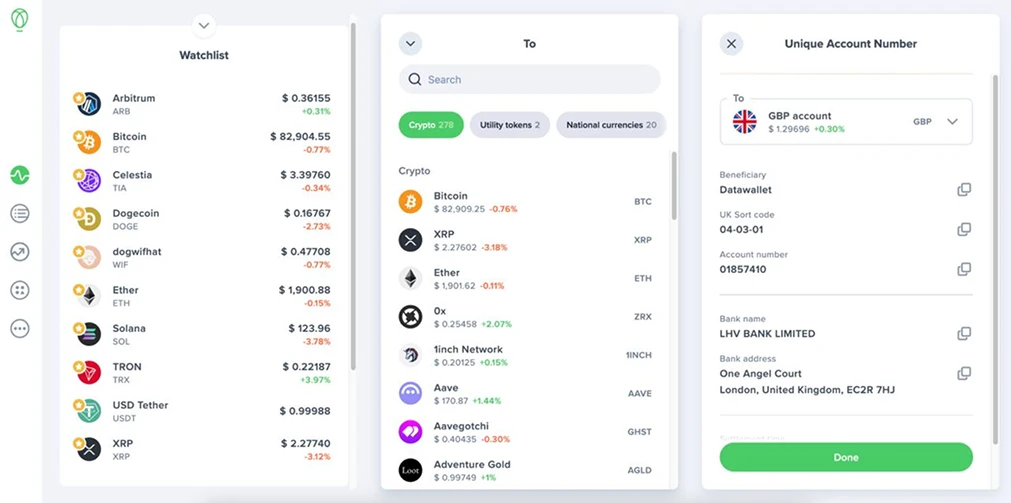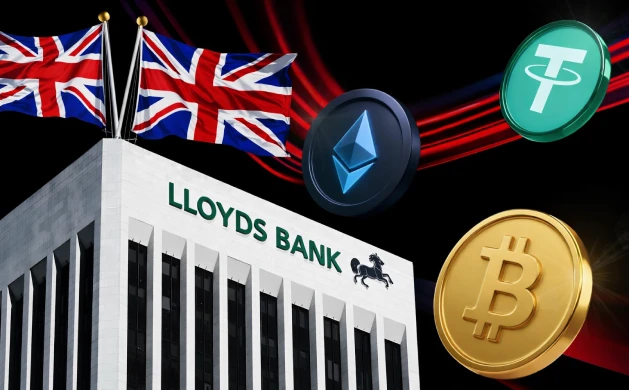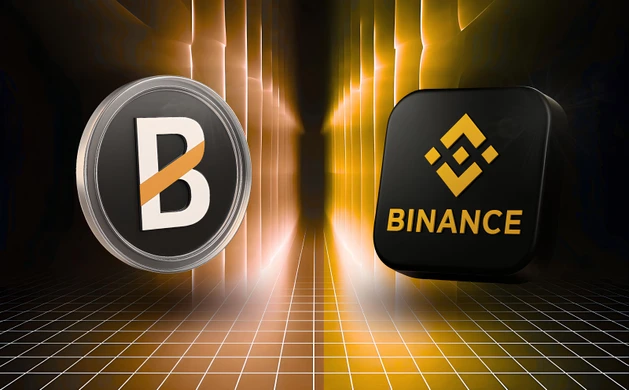Best Crypto Exchanges in Europe
.webp)
Summary: Crypto trading in Europe is shaped by the Markets in Crypto-Assets Regulation (MiCA), a clear framework that standardizes the digital asset market across EU member states. Investors can engage with regulated platforms that comply with MiCA’s consumer protection standards.
Here is a list of the five best cryptocurrency exchanges operating in Europe:
Kraken is the best exchange in Europe because it is MiCA compliant, offers deep EUR liquidity with SEPA funding, transparent fees, and a long track record of security and proof of reserves.
Available Assets
400+ Cryptocurrencies
Deposit Methods
IBAN, SEPA, Bank Transfer, Cards, PayPal & More
Trading Fees
0.16% - 0.26% Depending on Order Type
Top Crypto Trading Platforms in Europe
Cryptocurrency trading in Europe is governed by the Markets in Crypto-Assets Regulation (MiCA), which provides a unified legal framework across EU member countries. While digital currencies aren't recognized as legal tender, individuals can trade crypto on exchanges that comply with MiCA standards. Below is a comparison table of the top platforms for European investors.
| Exchange | Cryptocurrencies | Trading Fees | EUR Deposit Methods | Key Features |
|---|---|---|---|---|
| Kraken | 400+ | Maker 0.16%, Taker 0.26% | SEPA, Bank Transfer, Cards, Google Pay, Apple Pay, PayPal | Kraken Pro, 5x Leverage, Futures, Staking, Margin |
| Uphold | 250+ | 0.8% - 2.95% | SEPA, Bank Transfer, Apple Pay, Google Pay, Cards | Multiple Asset Classes, Staking, Uphold Card |
| Bitpanda | 200+ | 1.49% | SEPA, Bank Transfer, Cards, Neteller, Skrill | Multiple Asset Types, Bitpanda Card, Savings Plan |
| OKX | 350+ | Maker 0.08%, Taker 0.1% | SEPA, Debit/Credit Cards, Apple Pay | Futures, Options, DeFi Products, NFTs, OKX Wallet |
| Binance | 350+ | 0.1% | SEPA, Debit/Credit Cards, P2P, Apple Pay, Google Pay | Spot, Futures, Staking, Copy Trading, NFT Marketplace |
1. Kraken
Kraken remains the leading cryptocurrency exchange for European traders, consistently praised for its advanced security measures and transparent operations. Established in 2011, it now serves more than 15 million clients globally, offering access to over 400 cryptocurrencies for spot trading.
The platform appeals strongly to both beginners and experienced traders through distinct offerings like Kraken Pro, designed specifically for professional investors. Beyond standard crypto trading, it provides margin trading with up to 5x leverage and futures markets.
Users can also earn passive income with the Auto Earn feature, delivering yields of up to 10% APR, alongside crypto staking services offering returns as high as 17% APR. Kraken’s commitment to transparency is demonstrated by its regular 1:1 Proof of Reserves audits.
Platform Highlights:
- Fees: Trading fees start from 0.16% for maker and 0.26% for taker.
- Supported Assets: Over 400 cryptocurrencies.
- Regulation & Licensing: Fully compliant under MiCA regulations and licensed across various European jurisdictions.
- EUR Deposit Methods: SEPA transfers, bank transfers, debit/credit cards, Google Pay, Apple Pay, PayPal and iDEAL.

2. Uphold
Uphold is a standout choice in Europe for those new to crypto, thanks to its simplified trading approach and intuitive user experience. Uphold has attracted 10 million users by allowing instant, one-step trading across multiple asset types without the complexity found on traditional exchanges.
Users can effortlessly swap 250+ cryptocurrencies, 4 precious metals, and 27 fiat currencies directly within a single account. Additionally, Uphold offers a competitive crypto earning program, providing staking rewards of up to 10.6% APY across a variety of digital assets.
A distinctive feature of Uphold is its dedication to transparency and security. Unlike many competitors, Uphold does not lend customer assets; instead, it actively demonstrates financial integrity by publishing a real-time record of its assets and liabilities every 30 seconds.
Platform Highlights:
- Fees: Transparent pricing with spreads averaging between 0.8% to 2.95%.
- Supported Assets: Over 250 cryptocurrencies, 4 precious metals and 27 fiat currencies.
- Regulation & Licensing: Holds a MiCA license and is accessible across Europe.
- EUR Deposit Methods: SEPA transfers, bank transfers, Apple Pay, Google Pay, credit cards and debit cards.

3. Bitpanda
Bitpanda is one of Europe's most trusted investment platforms, headquartered in Austria and serving over 6 million users. Established in 2014, it combines cryptocurrency trading with access to traditional financial instruments, enabling users to diversify their portfolios effortlessly.
Investors can trade crypto assets alongside fractional stocks, ETFs, precious metals, and commodities. Additionally, Bitpanda offers distinctive investment products like Crypto Indices, allowing investors to automatically diversify across the crypto market with a single investment.
Security is central to Bitpanda’s operations, highlighted by its ISO27001 certification, robust offline wallet storage for cryptocurrencies, and stringent adherence to European regulatory standards. Bitpanda maintains full transparency, complies strictly with AML and GDPR guidelines.
Platform Highlights:
- Fees: Trading fees average around 1.49%.
- Supported Assets: Over 200 cryptocurrencies, alongside 3,000+ fractional stocks, ETFs, commodities, and precious metals.
- Regulation & Licensing: Fully regulated and licensed across Europe.
- EUR Deposit Methods: SEPA bank transfers, debit cards, credit cards, Neteller and Skrill.

4. OKX
OKX is gaining traction across Europe for its advanced trading tools and extensive Web3 ecosystem. It operates in more than 180 regions worldwide, accepts deposits in 60+ currencies, and the interface can be used in 8 languages, including French, Spanish, Polish and English.
The exchange offers traders a sophisticated platform with ultra-low latency APIs, deep liquidity pools, and comprehensive market analytics. This ensures traders can execute complex trading strategies, such as perpetual contracts and multi-leg options trades, with precision and speed.
Investors can explore yield-earning products, leverage crypto-backed borrowing options, and engage with blockchain-based decentralized apps (dApps) like the in-built NFT marketplace. These innovative financial tools position OKX as a gateway into the next generation of digital finance.
Platform Highlights:
- Fees: Low fees starting from 0.08% maker and 0.1% taker.
- Supported Assets: Over 350 cryptocurrencies.
- Regulation & Licensing: Complies with European regulatory frameworks and adheres to MiCA standards.
- EUR Deposit Methods: SEPA transfers, credit/debit cards and Apple Pay.

5. Binance
Binance is the world's largest exchange by trading volume and user base. Serving over 270 million global users in more than 180 countries, it offers European traders unmatched liquidity, enabling seamless transactions across an extensive selection of over 350 cryptocurrencies.
Users gain access to multiple trading options, including spot trading, leveraged futures, and margin accounts, allowing diverse investment strategies. Binance Earn provides passive income streams through staking, yield farming, and automated investment tools like Auto-Invest.
Binance maintains a reputation for security and transparency, exemplified by its regular Proof-of-Reserves audits. The platform also provides comprehensive 24/7 multilingual customer support and hosts a vibrant NFT marketplace, enabling traders and collectors to buy, sell, and stake NFTs.
Platform Highlights:
- Fees: Competitive spot trading fees from 0.1%.
- Supported Assets: Over 350 cryptocurrencies.
- Regulation & Licensing: Fully compliant with MiCA standards and regulated across major European jurisdictions.
- EUR Deposit Methods: SEPA bank transfers, debit/credit cards, P2P trading, Apple Pay, and Google Pay.

Is Crypto Regulated in Europe?
Cryptocurrency regulation in Europe has taken a significant step forward with the introduction of the Markets in Crypto-Assets Regulation (MiCA), a comprehensive framework designed to standardize crypto rules across the European Union.
Fully effective since December 30, 2024, MiCA creates consistent guidelines, requiring crypto service providers and asset issuers to obtain licenses and maintain transparent operations. While cryptocurrencies are not recognized as legal tender, MiCA supports their use as tradable digital assets, promoting market integrity and investor confidence.
Outside the EU, the UK independently pursues regulations aimed at protecting consumers, particularly by restricting risky practices like investing borrowed funds into cryptocurrencies.
How is Crypto Taxed in Europe?
Cryptocurrency taxation in Europe is undergoing significant transformation, driven by the European Union's efforts to standardize and enhance transparency across member states.
Complementing MiCA, the EU has introduced the eighth version of the Directive on Administrative Cooperation (DAC8), which mandates crypto-asset service providers to report transactions involving EU residents to national tax authorities. This directive seeks to combat tax evasion by increasing the transparency of crypto transactions.
Tax treatment of cryptocurrencies varies across Europe. For instance, Germany exempts individuals from capital gains tax if they hold crypto-assets for more than a year, while France imposes a flat tax rate on crypto gains. Italy has proposed increasing the tax on crypto capital gains from 26% to 42%, though this has faced political opposition.
Cryptocurrency Adoption in Europe
By 2025, Europe's crypto market is projected to achieve revenues of approximately US$14.3 billion, supported by an expanding user base forecasted to exceed 218 million individuals. This translates to roughly 26% of Europe's total population engaging actively with digital assets.
Major factors fueling Europe's crypto growth include widespread acceptance among retail investors and institutional firms, significant developments in decentralized finance (DeFi), and growing utilization of cryptocurrencies for cross-border transactions.
.webp)
How to Buy Bitcoin in Europe
For those looking to buy Bitcoin, the process involves selecting a reputable exchange, completing identity verification, depositing funds, and executing the purchase. Here’s a quick guide to trading BTC in Europe:
- Select Exchange: Choose an exchange that complies with European regulations and supports Euro (EUR) transactions. Platforms like Kraken, Coinbase, Bitstamp, eToro, and Bitpanda are popular choices among European investors.
- Verify Your Account: Register on your chosen platform and complete the necessary identity verification processes. This typically involves providing official identification documents and proof of residence.
- Deposit Funds: Add funds to your trading account using supported methods such as SEPA transfers, bank cards, or digital wallets.
- Purchase Bitcoin: Head to the trading section of the exchange, select Bitcoin (BTC), and specify the amount you wish to purchase. Review the current market rates and confirm the transaction.
By following these steps, European investors can confidently trade Bitcoin within a regulated environment.
Final Thoughts
Cryptocurrency trading in Europe is now clearer and safer thanks to MiCA, which provides essential protections and regulatory clarity for investors.
Choosing the right exchange is important, whether you're a beginner or an experienced trader. Platforms like Kraken, Uphold, Bitpanda, OKX, and Binance each offer distinct advantages tailored to different investment styles and needs.
Frequently asked questions
What are the safest crypto wallets in Europe?
The safest wallets for European crypto investors include hardware wallets like Ledger and Trezor, known for their strong encryption and offline storage capabilities, as well as software wallets such as Exodus and MetaMask, popular for convenience and user-friendly interfaces.
Are profits from cryptocurrency trading taxable everywhere in Europe?
Cryptocurrency tax rules differ across European countries. Most nations consider crypto trading profits as taxable capital gains, but specifics vary, for example, Germany exempts long-term gains held over a year, while France applies a fixed tax rate on crypto profits.
Can I use European cryptocurrency exchanges if I reside outside the EU?
Yes, many European exchanges like Kraken, Binance, and Bitpanda are accessible internationally. However, availability can vary based on local regulations, so it’s important to check each platform’s terms for specific country restrictions.
How does DAC8 affect crypto tax reporting in Europe?
The Directive on Administrative Cooperation (DAC8) mandates that crypto-asset service providers report transactions involving EU residents to national tax authorities. This enhances tax transparency and aids in combating tax evasion. Investors are advised to maintain accurate records of their crypto transactions to ensure compliance with DAC8.

Written by
Antony Bianco
Head of Research
Antony Bianco, co-founder of Datawallet, is a DeFi expert and active member of the Ethereum community who assist in zero-knowledge proof research for layer 2's. With a Master’s in Computer Science, he has made significant contributions to the crypto ecosystem, working with various DAOs on-chain.










